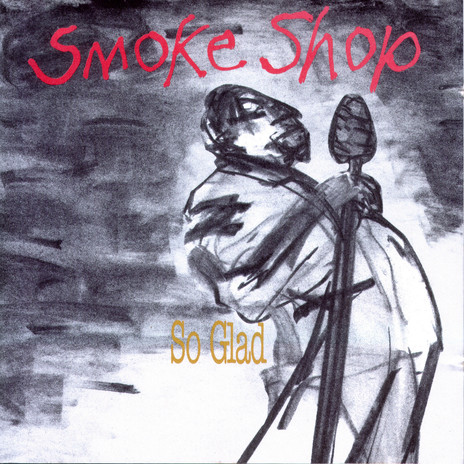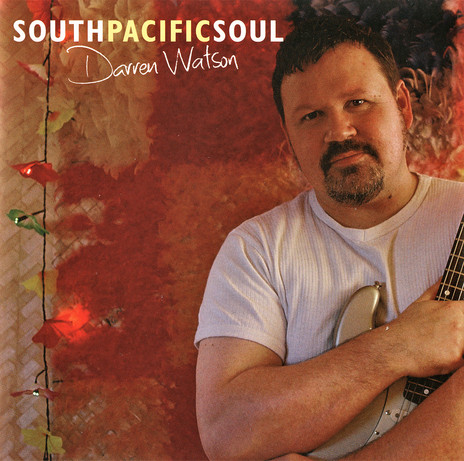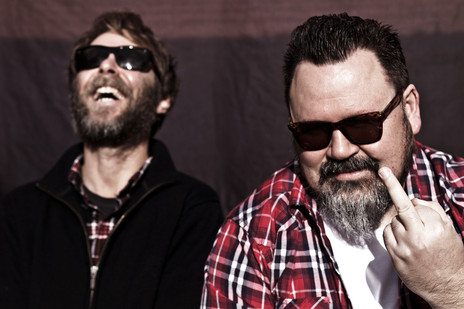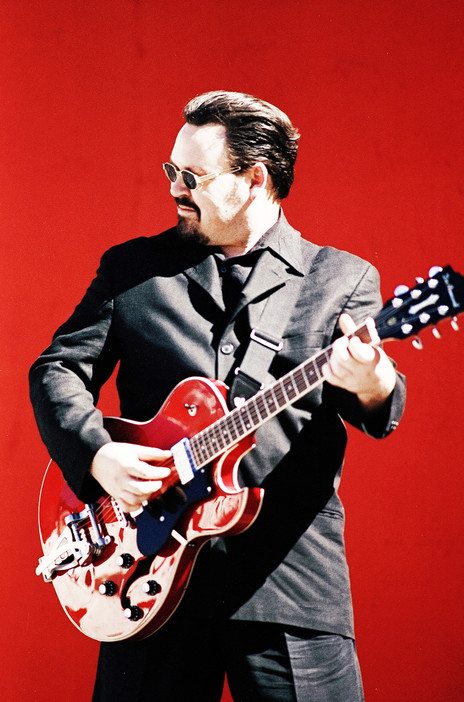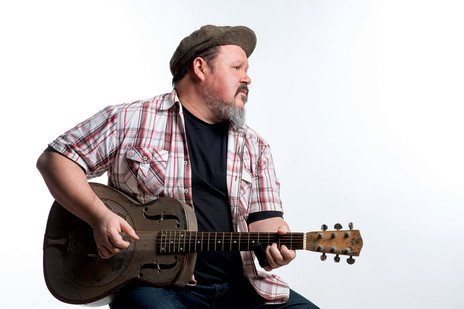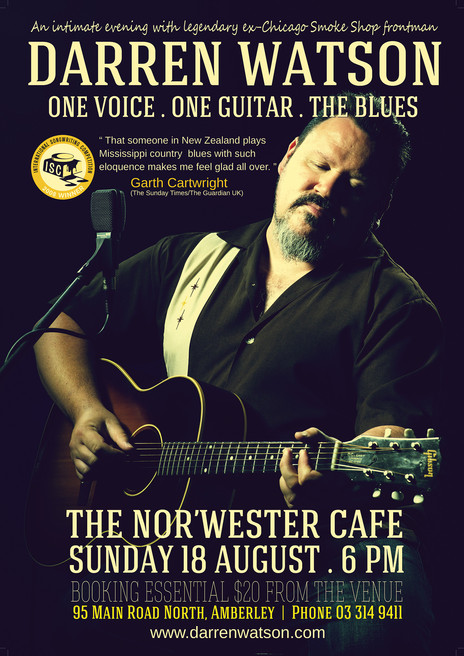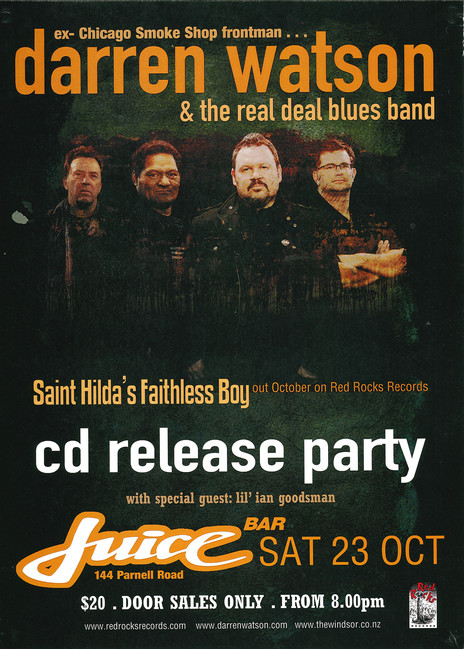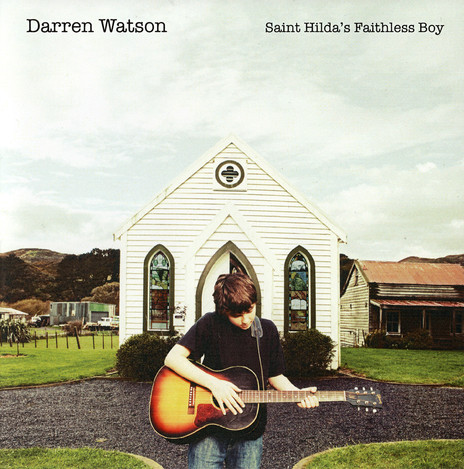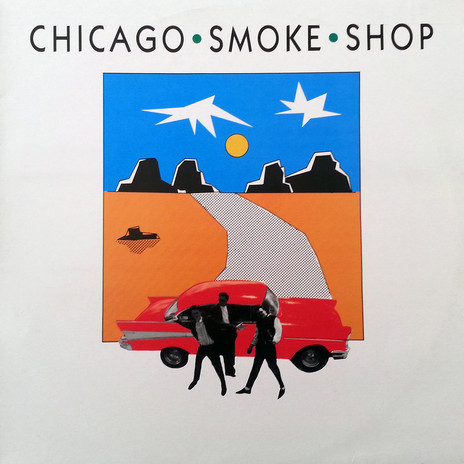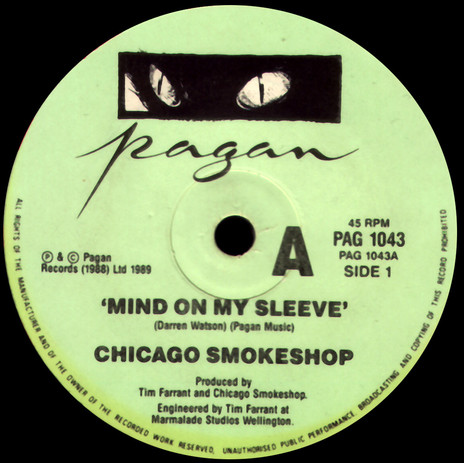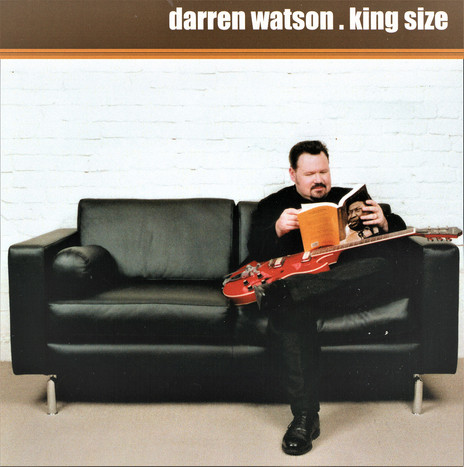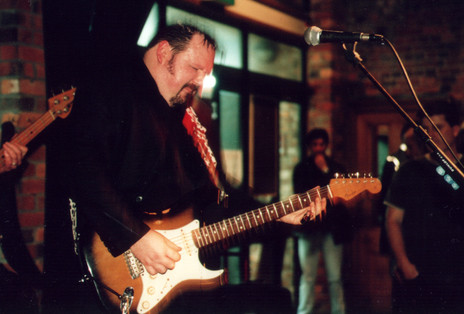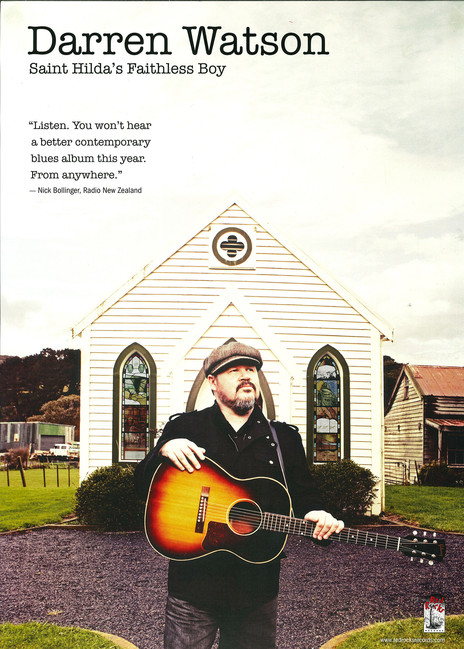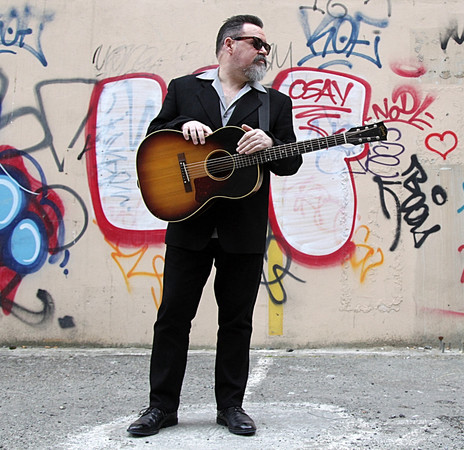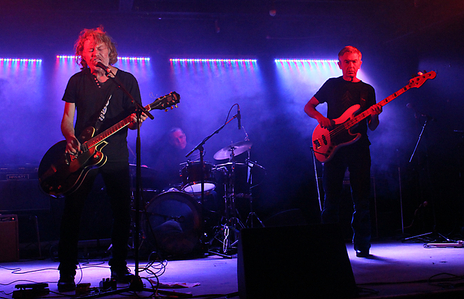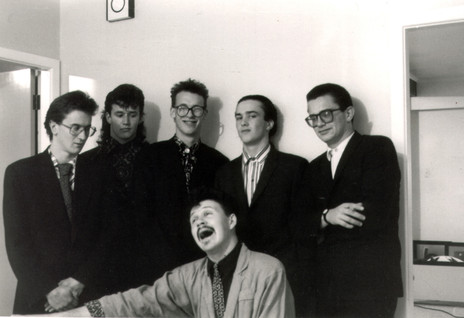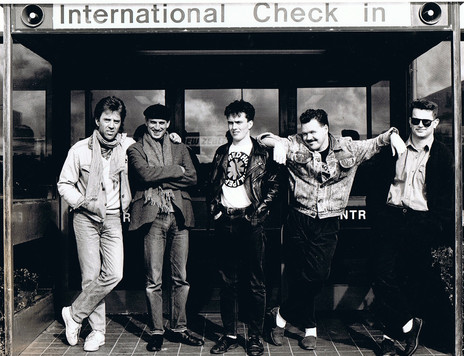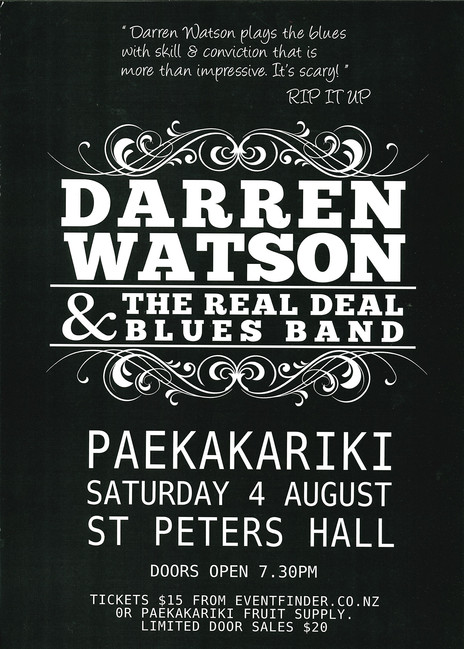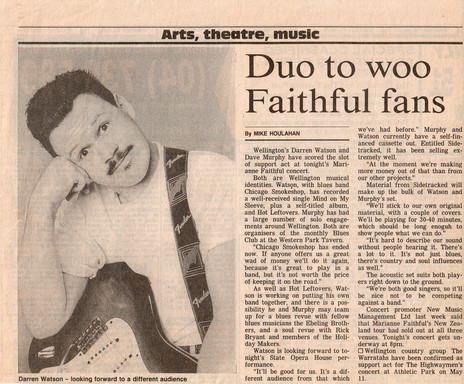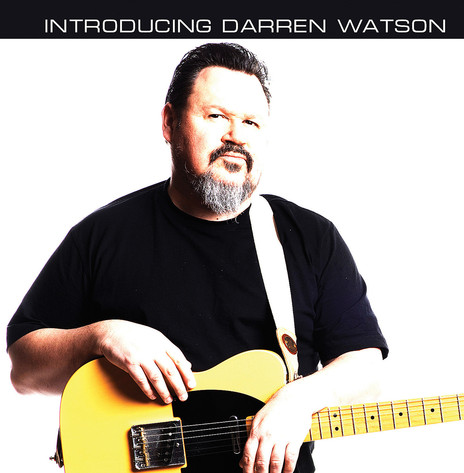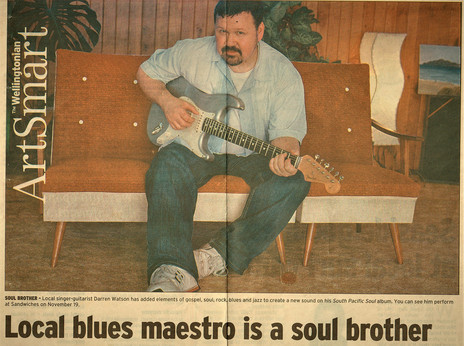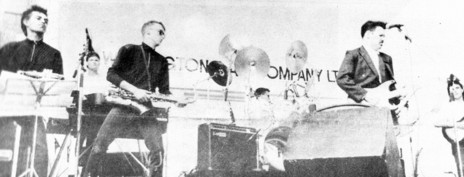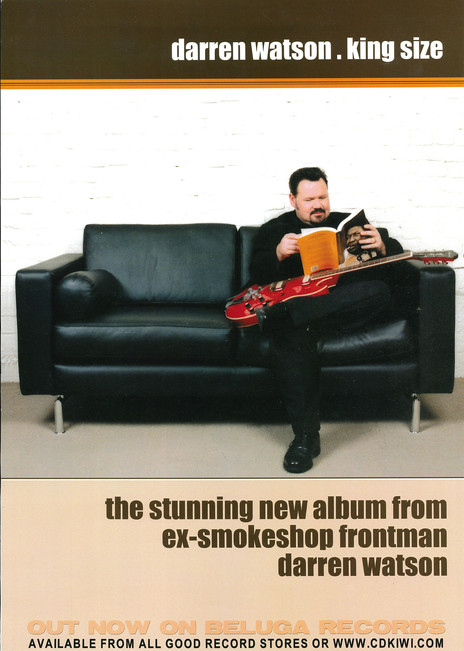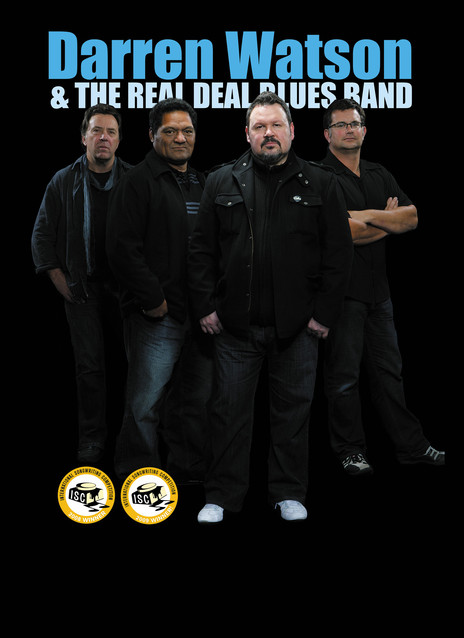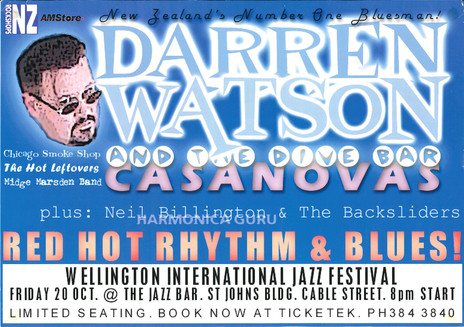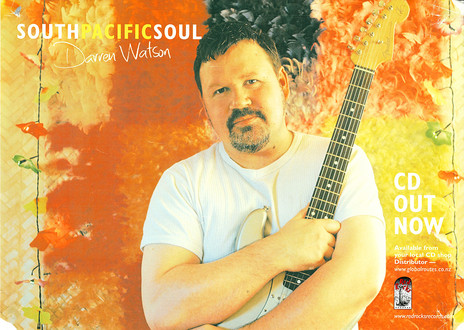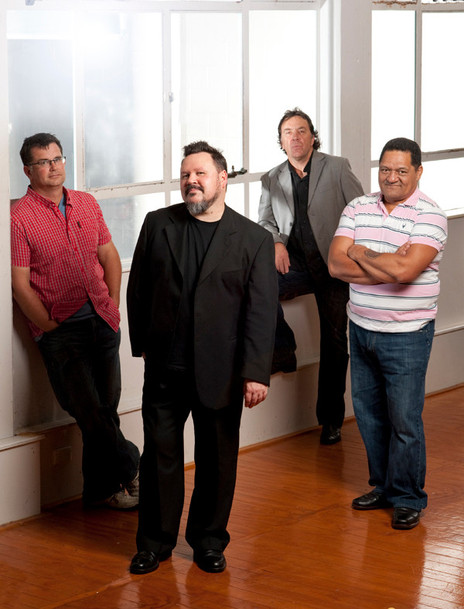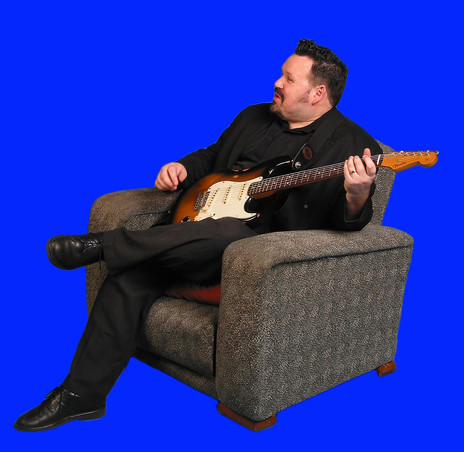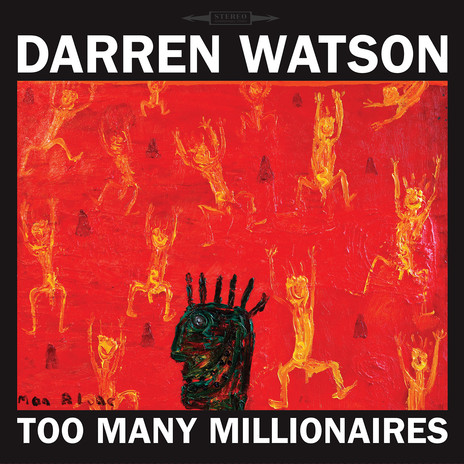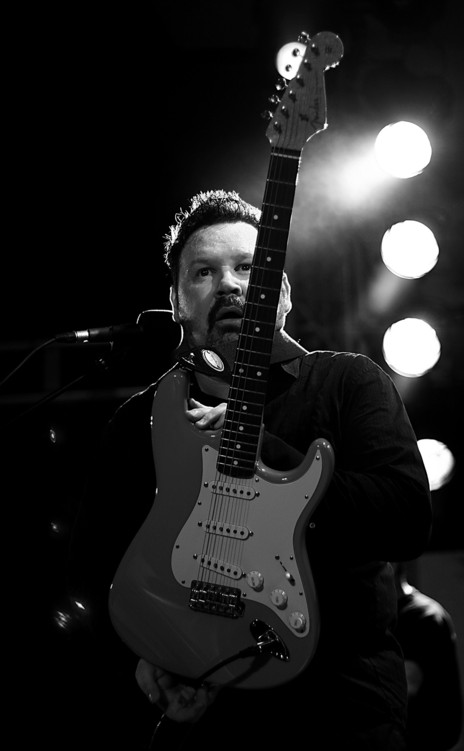The homework paid dividends on their repertoire and developing blues styles as they took a new band in to six months of rehearsals. The name Chicago Smoke Shop was a last-minute decision prompted by a copy deadline for a gig at Wellington’s Cricketers Arms. It was meant to indicate a blues band without being too literal. The named stayed with them for four years, until 1989 when the “Chicago” was dropped as their blues evolved and Casey departed.
Chicago Smoke Shop was a large, ambitious and expensive project.
Chicago Smoke Shop was a large, ambitious and expensive project, with horn section, keys, backing vocals, rhythm guitar, bass and drums – plus a PA and sound engineer. Watson stood front and centre as lead singer and guitarist as his influences moved from Muddy and BB King to the more soulful Stax/Shelter period Albert King, with a touch of Otis Redding. The revue-style group travelled the length and breadth of the country playing in taverns, the places where the car parks were twice as big as the venues. The name, aided by the tight and sharp presentation, led many punters to think that they were an international touring band, all adding to their growing reputation.
Their first big break was scoring the opening slot for the Robert Cray Band in 1987. Further international supports followed for Koko Taylor in 1988, George Thorogood in 1989 and The Fabulous Thunderbirds in 1990.
In 1988 the band recorded nine demos of blues covers over three days at Wellington’s Marmalade studio, with Tim Farrant engineering and producing. The session was picked up by Trevor Reekie at Pagan Records and released as their self-titled debut album in May 1989. The lead single ‘Mind On My Sleeve’ got to No.37 on the national sales charts and the “demo” album sold over 5000 copies.
The prefix “Chicago” was dropped from the name as the band went into Marmalade studio again in July 1990 to record a mostly original set of Watson’s material. By now the influences of soul and funk were stronger: the blues was still there but was less obvious, allowing Watson to create a set of fine originals. The album So Glad was also released on Pagan, and more importantly led by the radio-friendly singles, ‘Another Man’, ‘So Glad’, and ‘I Can’t (Live Without Your Love)’. These were the days of label and distributor plugging for radio play. Pagan was very effective at this.
With a new album to promote there was more big touring, supports, TV appearances and Watson became road-hardened, then road-weary. The miles generated a huge fan base, but after all the bills were paid, very little income. Watson was 19 when he formed Chicago Smoke Shop and by 23 was a broke veteran. He went into survival mode: playing paying pub gigs with The Hot Left Overs and the ubiquitous teaching / working in the music shop. But he never stopped writing.
In 1995, with the large-scale touring band days behind him, Watson recorded under his own name for the first time. Overnight Sensations was recorded and mixed at Wellington’s Mediate studio over a four-week period and was released in 1998 on Pagan Records. It was a bold step away from the blues and was crafted to demonstrate Watson’s versatility as a singer and songwriter, and more importantly to create an identity for him outside the Chicago and Smoke Shop brands. It was more John Hiatt than Howlin’ Wolf. He retained the name Overnight Sensations as his working band name for a number of years.
The 2002 album King Size was a more measured affair. Reworking blues and soul covers alongside originals, it was recorded with Tim Farrant at Marmalade, over two years, mostly in down-time. The blues grooves were back – with a nod to those in the album title – albeit with more rhythm than 12-bar structures. The independently released King Size was nominated for Best Roots Album in the 2003 New Zealand Music Awards.
Throughout this period Watson worked day jobs, local gigs and the occasional small-scale tour. He also continued to develop his writing, which was showcased and internationally acknowledged with his next release.
2005’s South Pacific Soul was recorded at Trident Studio in Wellington. Produced by Nick Bollinger and released on his Red Rocks Records, the album featured an alumni of local musicians from the likes of TrinityRoots, Twinset, Southside of Bombay and the Windy City Strugglers. It had an almost too broad a range of styles, with the vocal phrasing reference points leaning towards another influence, Elvis Costello. The soul-blues shuffle of ‘All Going Wrong’ was the winner of the blues section of the prestigious 2009 International Songwriting Competition in Nashville. Judges for the competition included Tom Waits, James Cotton, John Mayall, and Alligator Records president Bruce Iglauer. This gave Watson some international profile while the internet began to provide a passive income through his well-received teaching videos.
His next album, Saint Hilda’s Faithless Boy, was recorded by his local working group, the four-piece Real Deal Blues Band, and consisted largely of their live set of his recently penned material. A relatively lucrative song placement in a TV programme funded a period at STL Studio in Wellington, formerly Marmalade. This allowed for the “live in the studio” recording of material that Watson had been putting together in his home studio, and was well rehearsed by the live band. The resulting album of shuffles, urban blues and country soul was released on Red Rocks Records in 2010 and garnered excellent local and international reviews. Further international recognition came from the track ‘Can’t Get Enough of You’ placing third in the Nashville International Songwriting competition and an invitation to play at the International Blues Foundation Challenge in Memphis in 2012.
The same year saw invitations to play at The Australian Blues Music Festival in Goulburn, New South Wales and the Blues on Broadbeach Festival in Queensland. However, back home the tough economics of touring as an independent artist limited his national reach, but locally he had bar gigs and a residency at the Lido Café in Wellington.
Watson wrote, recorded and released a single called ‘Planet Key’, a satirical political commentary song accompanied by an animated video.
Then things got a bit weird. His next release, a single called ‘Planet Key’, took him up against the Electoral Commission and to the High Court and Court of Appeal. 2014 was election year and the National Government under Prime Minister John Key was seeking re-election. Watson wrote, recorded and released the single, a satirical political commentary song accompanied by an animated video created by Jeremy Jones. The Electoral Commission regarded the material as an electoral programme, which could never be sold or played unless labelled as such. The song was removed from sale and airplay while Watson took the Commission to Court. After appeals, the final decision was not released until October 2016. Two years later, Watson and Jones were exonerated.
Watson’s fifth solo album, the rather ironically titled Introducing, was released in late 2014. This varied and expansive set was a result of becoming more self-assured and self-contained; recorded over a year with rhythm tracks done at Wellington’s Surgery studio, it was then completed at his home studio with engineering by Andrew Downes and mastering by Mike Gibson at Munki. A notable aspect was the inclusion of two covers, both by local songwriter Bill Lake. Watson also featured his acoustic playing on this release, which was an indication of his future direction. The album peaked at No.26 on the NZ Top 40 Album Chartand No.6 on the NZ Artists Chart. The ‘Planet Key’ controversy certainly raised the profile.
During this period Watson began playing and touring acoustic shows. In November 2017 he took this style in to The Surgery Studio in Wellington with Lee Prebble engineering a two-day live session. The result was an all-acoustic album released as Too Many Millionaires. The set saw him reunited with fellow Chicago Smoke Shop founder Terry Casey on harmonica, accompanied by Watson’s live band, and he again tipped his hat to local song writer Bill Lake with the title track. Using social media, the album was crowd funded by pre-sales and also released on vinyl, Watson’s first since the Smoke Shop days. The material was personal and political, the voice of a true Kiwi bluesman.
If the blues is a model form, Darren Watson has come full circle back to the roots.
